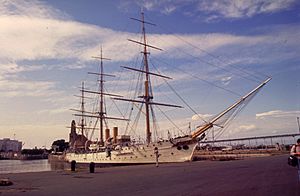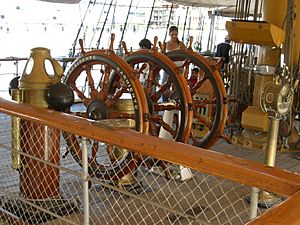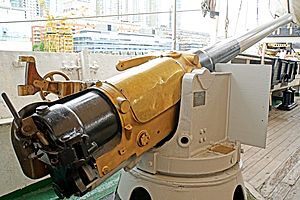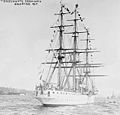ARA Presidente Sarmiento facts for kids

Moored at Puerto Madero, Buenos Aires
|
|
Quick facts for kids History |
|
|---|---|
| Name | Presidente Sarmiento |
| Namesake | Domingo Faustino Sarmiento |
| Builder | Laird Brothers, Birkenhead, England |
| Launched | 31 August 1897 |
| In service | 1897 |
| Out of service | 1961 |
| Status | Museum ship in Buenos Aires, Argentina |
| General characteristics | |
| Type | Sail training ship |
| Displacement | 2,750 tonnes |
| Length | 81 m (266 ft) |
| Beam | 13.11 m (43.0 ft) |
| Draught | 5.64 m (18.5 ft) |
| Propulsion | Steam, 3-cylinder compound, 1,000 hp (750 kW), ship rig |
The ARA Presidente Sarmiento is a special museum ship located in Argentina. It was first built as a training ship for the Argentine Navy. A training ship helps new sailors learn how to sail and work on a ship. This ship was named after Domingo Faustino Sarmiento, who was the seventh President of Argentina. Many people believe it is the last complete training ship from the 1890s that could still travel the seas.
Contents
The Ship's Journey
The Presidente Sarmiento was built for the Argentine Naval Academy. This is a school where young people learn to become naval officers. The ship went on 37 training trips each year. Six of these trips were circumnavigations, meaning the ship sailed all the way around the world!
The ship stopped being a seagoing vessel in 1938. This means it no longer traveled long distances on the ocean. However, it continued to be used on Argentine rivers around 1950. It also served as a stationary training ship until 1961. This means it stayed in one place to help train sailors.
Today, the ship looks just like it did in 1898. It is a museum ship in Puerto Madero, which is a busy area near downtown Buenos Aires.
How the Ship Moved
The Presidente Sarmiento was a sailing ship, but it also had a powerful engine.
The Engine
Besides its sails, the ship had a large steam engine. This engine used steam from two boilers that burned coal. The smoke from these boilers went out through the back smokestack.
There was also another boiler that provided steam for other things. This included two engines that made electricity. These generators were on the main deck of the ship.
Fuel for the Engine
The ship had a single storage area for coal. This coal bunker was located between the two boiler rooms.
Steering the Ship
The ship had a special steering system with three wheels. Up to six sailors could work together to turn these wheels. This system used chains to control the rudder, which steers the ship.
Usually, an electric motor helped steer the ship. This made it easier for normal operations. But having the three-wheel system was great for training new cadets. They learned how to steer the ship with teamwork.
Ship's Weapons
The Presidente Sarmiento was a training ship, but it also carried weapons.
Cannons
There were four large cannons on the ship. Two were on each side, in the middle part of the ship. There were also some smaller weapons. The museum says these main cannons were 5-inch guns. Some records show these guns might have had some armor, but today they are bare.
Torpedoes
The ship used to have a special opening at the front called a torpedo scuttle. This was used to launch torpedoes using gravity. The scuttle has been removed and the opening sealed shut. However, in the museum, a torpedo is displayed on the main deck. It is placed as if it is ready to enter where the scuttle used to be. The ship also had more storage for torpedoes below the main deck.
Museum Ship Today
The Presidente Sarmiento is now a museum. It is docked in Puerto Madero, close to the Bicentennial Plaza. Its official name as a museum is the ARA Presidente Sarmiento Frigate Museum. Visitors can explore the ship and learn about its history.
See also
 In Spanish: ARA Presidente Sarmiento para niños
In Spanish: ARA Presidente Sarmiento para niños
- ARA Uruguay, another historic tall ship docked nearby.
- Argentine peso moneda nacional; the Presidente Sarmiento was featured on the 5 peso coin from 1961 to 1968.
Images for kids
 | Victor J. Glover |
 | Yvonne Cagle |
 | Jeanette Epps |
 | Bernard A. Harris Jr. |








